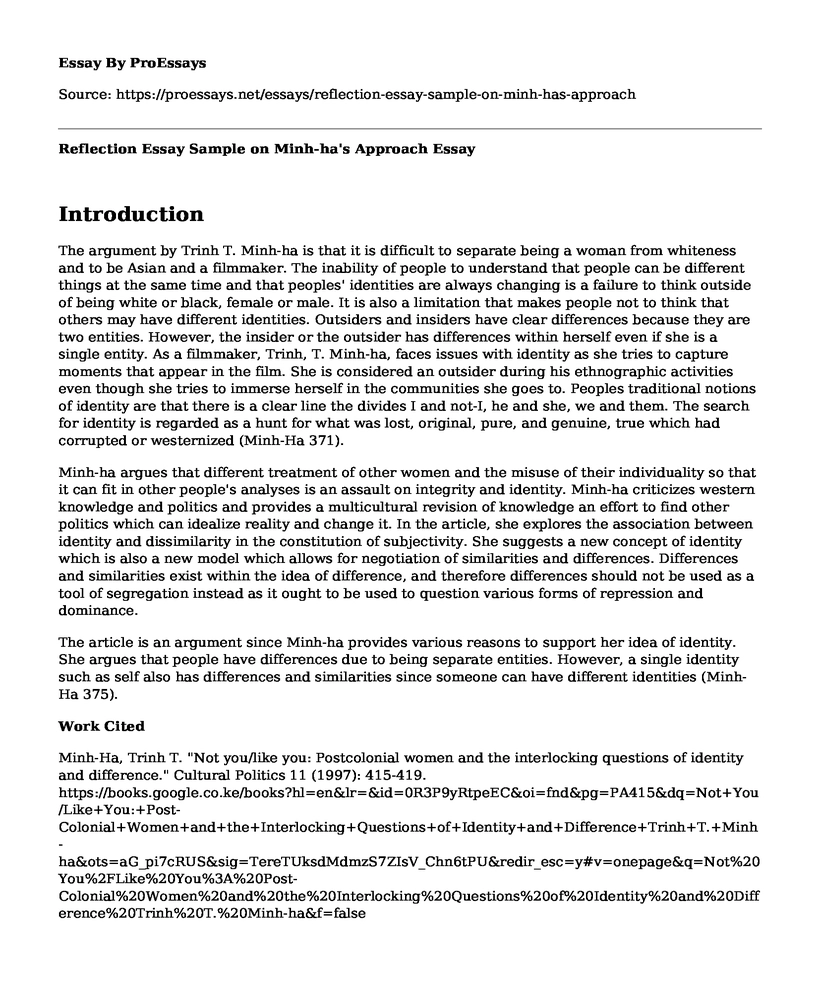Introduction
The argument by Trinh T. Minh-ha is that it is difficult to separate being a woman from whiteness and to be Asian and a filmmaker. The inability of people to understand that people can be different things at the same time and that peoples' identities are always changing is a failure to think outside of being white or black, female or male. It is also a limitation that makes people not to think that others may have different identities. Outsiders and insiders have clear differences because they are two entities. However, the insider or the outsider has differences within herself even if she is a single entity. As a filmmaker, Trinh, T. Minh-ha, faces issues with identity as she tries to capture moments that appear in the film. She is considered an outsider during his ethnographic activities even though she tries to immerse herself in the communities she goes to. Peoples traditional notions of identity are that there is a clear line the divides I and not-I, he and she, we and them. The search for identity is regarded as a hunt for what was lost, original, pure, and genuine, true which had corrupted or westernized (Minh-Ha 371).
Minh-ha argues that different treatment of other women and the misuse of their individuality so that it can fit in other people's analyses is an assault on integrity and identity. Minh-ha criticizes western knowledge and politics and provides a multicultural revision of knowledge an effort to find other politics which can idealize reality and change it. In the article, she explores the association between identity and dissimilarity in the constitution of subjectivity. She suggests a new concept of identity which is also a new model which allows for negotiation of similarities and differences. Differences and similarities exist within the idea of difference, and therefore differences should not be used as a tool of segregation instead as it ought to be used to question various forms of repression and dominance.
The article is an argument since Minh-ha provides various reasons to support her idea of identity. She argues that people have differences due to being separate entities. However, a single identity such as self also has differences and similarities since someone can have different identities (Minh-Ha 375).
Work Cited
Minh-Ha, Trinh T. "Not you/like you: Postcolonial women and the interlocking questions of identity and difference." Cultural Politics 11 (1997): 415-419. https://books.google.co.ke/books?hl=en&lr=&id=0R3P9yRtpeEC&oi=fnd&pg=PA415&dq=Not+You/Like+You:+Post-Colonial+Women+and+the+Interlocking+Questions+of+Identity+and+Difference+Trinh+T.+Minh-ha&ots=aG_pi7cRUS&sig=TereTUksdMdmzS7ZIsV_Chn6tPU&redir_esc=y#v=onepage&q=Not%20You%2FLike%20You%3A%20Post-Colonial%20Women%20and%20the%20Interlocking%20Questions%20of%20Identity%20and%20Difference%20Trinh%20T.%20Minh-ha&f=false
Cite this page
Reflection Essay Sample on Minh-ha's Approach. (2022, Dec 05). Retrieved from https://proessays.net/essays/reflection-essay-sample-on-minh-has-approach
If you are the original author of this essay and no longer wish to have it published on the ProEssays website, please click below to request its removal:
- Ethical Issues in Treating Childhood Obesity Paper Example
- The Syrian Refugee Crisis Essay
- Effect of Homelessness on Education - Essay Sample
- Essay Example on the Impact of Racism: Discrimination, Prejudice, and Resentment
- 9/11: US Policy Shifts After Terror Attack - Essay Sample
- Childhood Abuse: Psychological Challenges in Adulthood - Research Paper
- Social Inequality & Conflict Theory: Understanding Inequality in Society - Essay Sample







